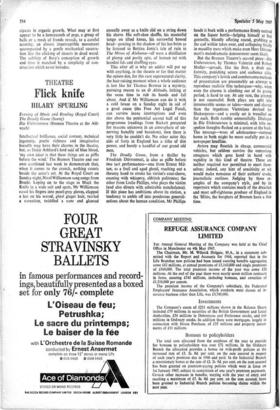THEATRE
Flick knife
HILARY SPURLING
Evening of Music and Reading (Royal Court) The Deadly Game (Savoy)
Die Unberatenen (Bremen Theatre at the Ald- wych)
Intellectual brilliance, social content, technical ingenuity, poetic richness and imaginative breadth may have their charms in the theatre, but, as Daisy Ashford's lord said of blue blood, 'my own idear is that these things are as piffle before the wind.' The Bremen Theatre and our own combined last week to demonstrate that, when it comes to the crunch, nothing counts beside the actor's art. At the Royal Court on Sunday night, Nicol Williamson sang songs from Brecht. Loping on to the stage as Mack the Knife in a wide suit and spats, Mr Williamson eased his fingers into pearl-grey gloves, clapped a hat on his waved, glace ginger hair, twirled a carnation, twiddled a cane and glanced casually away as a knife slid on a string down his sleeve. His soft-shoe shuffle, his masterful tango on tilted knees, his sorrowful bowed head—pouting in the shadow of his hat-brim as he listened to Bettina Jonic's tale of ruin in The Moon of Alabama—all were a distillation of plump and portly spiv, of human rat with hooded lids and shuffling eyes.
This after all is why an addict will put up with anything, in the theatre or for that matter the opium den, for this rare supernatural clarity, the hair-raising moment when a whole audience is lost like Sir Thomas Browne in a mystery, pursuing reason to an 0 Altitudo, itching at the same time to rub its hands and fall about. And if Mr Williamson can do it with a cold house on a Sunday night in aid of a good cause (the Free Art Legal Fund), can survive inane interruptions and even rise above the penitential second half of this programme (readings from Beckett presented for reasons unknown in an atmosphere of un- nerving banality and boredom), then there is very little he couldn't do. No other actor this side of forty in England has a tithe of this power, and barely a handful of our grand old men.
The Deadly Game, from a thriller by Friedrich Diirrenmatt, is also as piffle before two tart performances—one from Ernest Mil- ton, as a frail and aged ghoul, reaching out a rheumy hand to stroke his victim's coat-sleeve, coaxing with whispery, eldritch politeness; the other from Leslie Phillips, who plays the victim (and also directs with admirable nonchalance). If this piece has ambitions above its station, a tendency to amble off into ponderous generali- sations about the human condition, Mr Phillips heads it back with a performance firmly centred on the liquor bottle—helping himself at first genteelly, blandly offering round, grabbing as the cad within takes over, and collapsing finally in maudlin tears which make even Herr Dfirren- matt's melodramatic denouement seem likely.
But the Bremen Theatre's second piece—Die Unberatenen, by Thomas Valentin and Robert Muller—spreads, like the first, a drab uni- formity, punishing actors and audience alike. This company's lavish and cumbersome methods of presentation are presumably an attempt to reproduce realistic film techniques—why, when even the cinema is climbing out of its grainy period, is hard to say. At any rate, the attempt is not successful. Both plays are split into innumerable scenes or takes—more and shorter than the ingenious Victorians devised for Shakespeare—and a costly set is trundled on for each. Both ramble unmercifully. Dialogue in Die Unberatenen is minimal, with trite un- spoken thoughts flashed on a screen at the back. The message—woes of adolescence—rammed home in both might be more usefully put in a newspaper headline.
Actors may flourish in cheap, commercial vehicles, but seldom survive the censorious smugness which goes hand in hand with vapidity in this kind of theatre. These are neither required nor permitted to exert them- selves; indeed, any hint of sensitivity or wit would make nonsense of their authors' crude, journalistic outlines. Judging by these ex- amples of the company's style, and by its repertoire which contains much of the dreariest and most self-righteous produce of England in the 'fifties, the burghers of Bremen have a thin time.


































 Previous page
Previous page